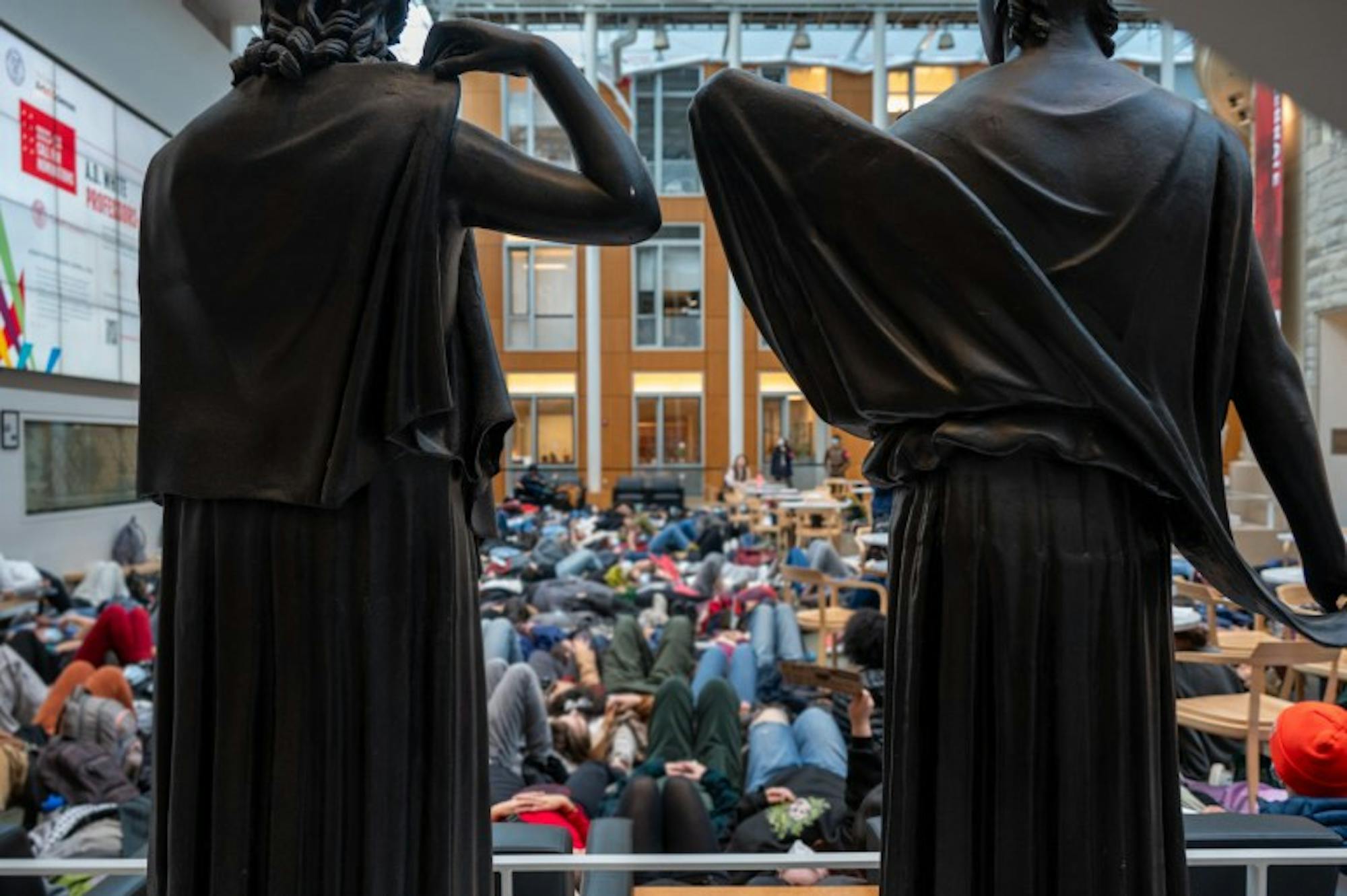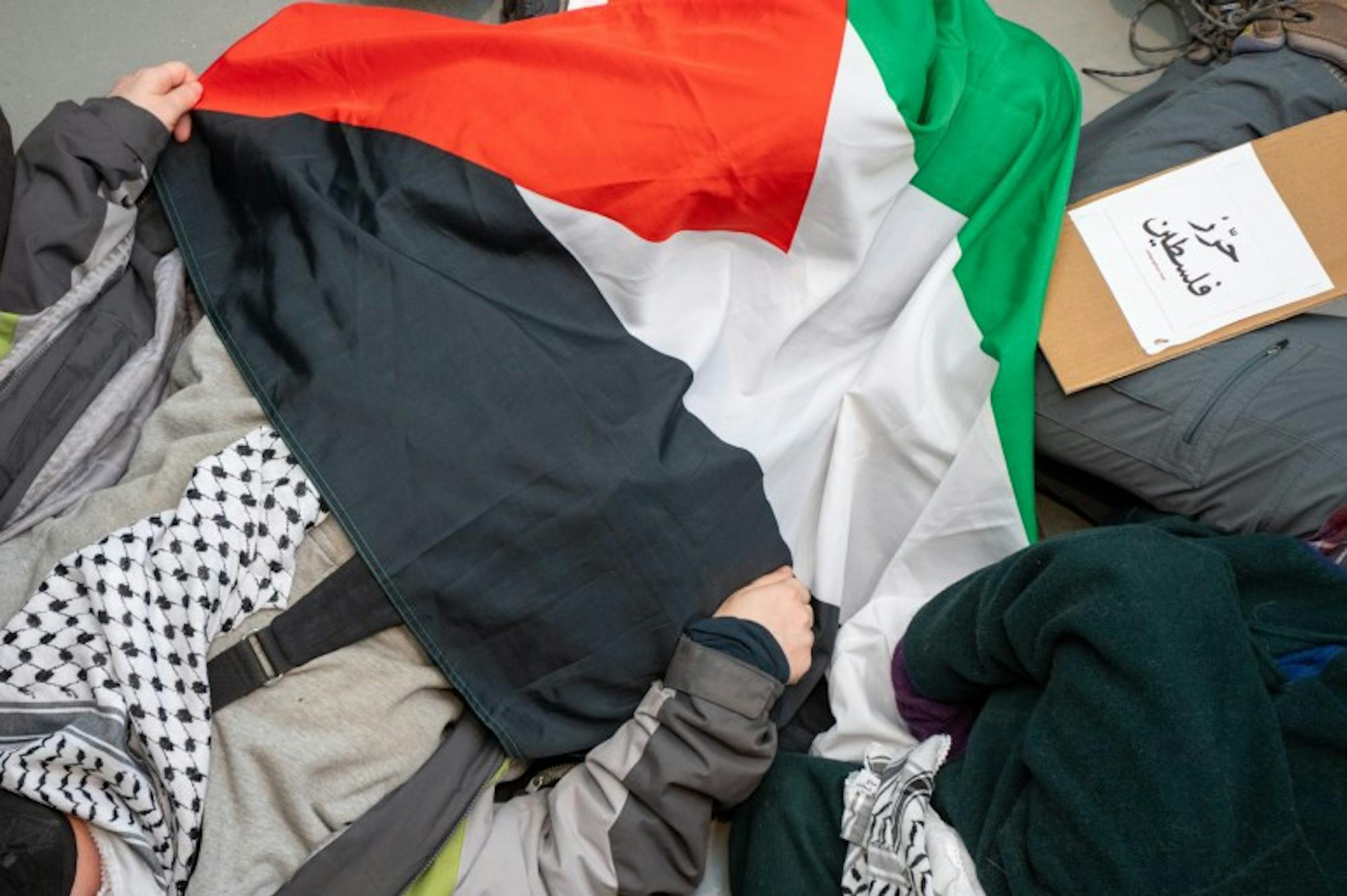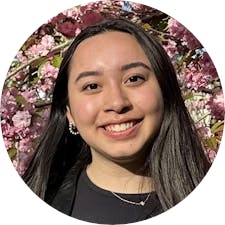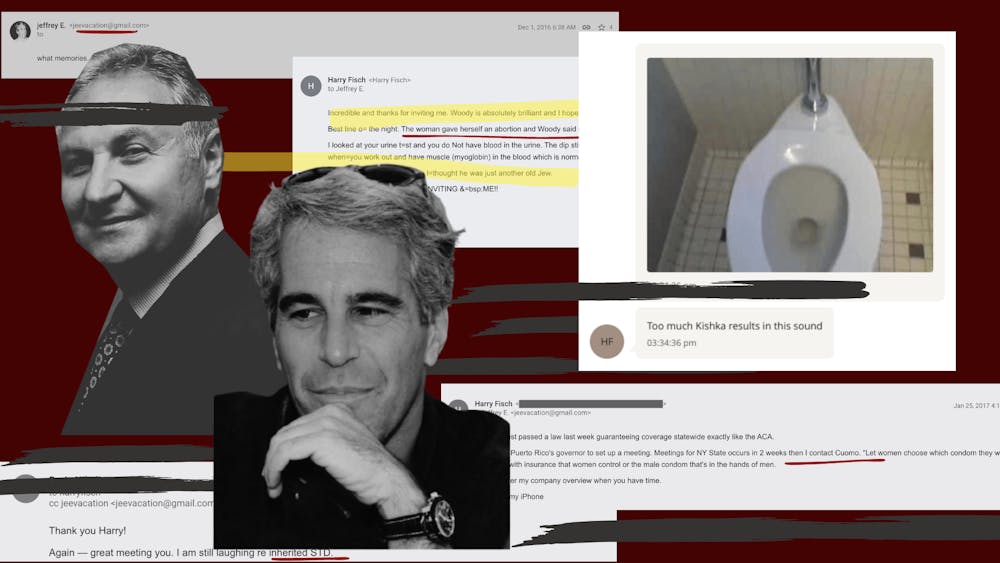Approximately 200 students sprawled on the ground of Klarman Hall on Thursday, Nov. 9, symbolizing the lives lost since the outbreak of the Israel-Hamas war on Oct. 7. Since Hamas initially attacked Israel, prompting Israel’s retaliation, about 1,400 Israelis and over 10,000 Palestinians, 40 percent of which are children, have been killed.
While students laid on the ground, Malak Abuhashim ’24, a member of the executive board of Cornell’s chapter of Students for Justice in Palestine, read the names of Palestinian children who were one year old or younger and died during the conflict. In between the reading of each name, the crowd chanted “Cornell is complicit in genocide.”
The sit-in intentionally lasted for 15 minutes in order to prevent law enforcement from disturbing the demonstration. Organizers also warned protestors not to block exits or engage with counter-protesters or the authorities. Around 15 attendees who were not supporting the protest were seen watching from the second floor of Klarman. They took photos, videos and notes.
“It just seemed that [the] number [of deaths] kept adding up,” Abuhashim said in a follow-up interview with The Sun, when asked about the motivations to stage an SJP die-in. “I really wanted to put a face [to these deaths] and humanize these numbers.”
As Israel retaliates against Hamas and invades the Gaza Strip, the humanitarian situation in the region — where nearly half of the population is under the age of 18 — has become increasingly dire. On Oct. 7, Israeli authorities cut off Gaza’s main source of electricity and fuel necessary for its only power plant to remain operational. In a Nov. 6 press conference, United Nations Secretary-General António Guterres called Gaza a “graveyard for children,” referencing the hundreds of children killed or injured every day in the region.
According to Abuhashim, whose Palestinian family was forced to relocate from present-day Israel, the organizers of the demonstration wanted to list the names of victims to emphasize the individual significance of each death rather than only displaying the destruction as a statistic. Abuhashim said that the chant “Cornell is complicit in genocide” refers to Cornell’s ties to Israel and the Administration’s lack of acknowledgment of Palestinian suffering.
SJP has criticized Cornell’s partnership with the Technion-Israel Institute of Technology at its Cornell Tech campus in New York City because the Technion develops military technology used in the Israeli Defensive Forces. In a statement posted to their Instagram account two days after President Martha Pollack omitted the words “Palestine” and “Palestinian” from her first two email statements regarding the conflict, SJP said that “Cornell University has continuously declined the recognition of Palestinian identity and suffering.”
“Can you please recognize my suffering? Can you please acknowledge that I exist?” Abuhashim said, regarding Cornell administration. “That [lack of acknowledgment] I think is the most painful thing about being a student here at Cornell — having to fight for my own basic rights as a human or as a student.”
Prior to staging the die-in, protestors gathered outside of Klarman Hall and chanted “From the river to the sea, Palestine will be free” and “Martha, Martha, you can’t hide — you’re silent on genocide.” The protesters held up a Palestinian flag and signs advocating for a ceasefire and objecting to Israel’s occupation of Palestine. Three speakers also spoke out about Palestinian liberation.
One speaker compared the increase in Islamophobia in the United States resulting from the conflict to the increase experienced after the Sept. 11, 2001 terrorist attacks.
“I’ve been talking to fellow brown people, fellow Arabs and fellow Muslims who have been here far longer than I have, and what they’re saying is that it’s starting to feel a lot like after 9/11 for Muslims,” they said. “You see all of these Islamophobic events happening: children being stabbed,” referring to an incident where a six-year-old Palestinian boy in Chicago was stabbed to death for being Muslim on Oct. 14, “[and] women being killed.”
Another speaker spoke about their experience being Jewish in the pro-Palestine movement.
“Many people, regardless of political or religious backgrounds, want you to believe that anything other than unequivocal, uncritical support for Israel is antisemitic,” the student said. “I am here to tell you, as a proud Jewish student, that this is false.”
The speaker proceeded to condemn what they described as the collective punishment and oppression of Palestinians by Israel.
“If you truly want to support Jewish people, you will call for an immediate ceasefire and for an end to Israeli oppression and apartheid. You will call for a full end of the occupation of Palestine and for all diplomatic solutions to be pursued to save all human life you can. Because we cannot be free until we are all free,” the speaker said.

At Harvard, a die-in on Oct. 19, similar to the one held in Klarman, ended in a physical altercation between a student filming the event and trained “student marshals.” The die-in at Cornell had a “safety team” present, composed of individuals, including an EMT, trained in first aid and de-escalation tactics. The team was on standby in case of an emergency or altercation. A legal support team was also present in Klarman, taking notes of the entire event.
A grad student, who wished to stay anonymous, commented on the event, saying, “Our whole goal is to get people's attention, and the power of a die-in is emphatic imagery to highlight loss of life, which is what we are trying to do.”
Much of the protest was not only in protest of the war, but also of the Administration's response to the crisis.
“I would say that a lot of students feel betrayed and unsafe right now. I think that our main priority is speaking on what is happening in Palestine, and what we're going through here is nothing compared to that. But the Administration is failing us in its basic promises to keep us safe and protect basics,” the student said. “The things that the Administration says that are supposed to indicate some semblance of safety are just so unaware of what makes us feel unsafe.”
A protester, who preferred to remain anonymous, spoke about their anger toward the University’s response to violence affecting Palestinian students and their families.
“[The Administration] hasn’t condemned anything [relating to Palestine]. They’re so quick to condemn the guy who posted everything… and as they should,” the anonymous protester said, referring to Patrick Dai ’24, the perpetrator of the antisemitic threats posted online.
“But they should also condemn the fact that some people’s families are getting bombed on the daily,” the protester continued. “And it’s unfathomable that they’ve been silent.”
Some students studying in Klarman Hall were unaware of the event prior to the entrance of protesters. Many of these students left after the protesters entered the building, but some remained seated at tables as protesters occupied much of the floor.
A student studying in Klarman throughout the die-in, who requested to remain anonymous, said that the event was a “good way to get everybody’s attention.” They further said that by disrupting people’s daily routines, the protesters forced people to pay attention to their cause who might otherwise not.
One Jewish student, who requested anonymity and whose studying was interrupted by the demonstration, however, said that she felt “unsafe” throughout the demonstration, noting that she interprets the chant “From the river to the sea, Palestine will be free” as “calling for the end of Israel.”
While the student said she understood the need to protest against the oppression occurring to Palestinians, she said that “there's not a clear distinction between [what is] pro-Hamas and [what is] pro-Palestine when you use Hamas’s rhetoric.”
Some attendees of the event were not in support of the die-in. Some individuals viewed and recorded the demonstration from afar and attempted to hand out flyers that advocated for the release of Israeli hostages from Palestine. Many of the die-in participants expressed their dismay for these attendees, feeling they were there to intimidate or post their identity and likeness online with intentions to blacklist or doxx them.

One attendee was Amit, a physics postdoctoral student, who only wished to be identified by his first name. Before the protest entered the atrium, he handed out posters that read “KIDNAPPED” and listed the names of individuals taken hostage by Hamas during the initial invasion. Many of these flyers are posted throughout Cornell’s campus and Ithaca Commons, as well as in other college campuses and cities around the world.
“I consider myself Israeli. I don't know what pro-Israel means in this case. Because again, I'm for a two-state solution,” Amit said in an interview with The Sun. “I’m for the Palestinian people. I don't think Hamas is for the Palestinian people. I don't think [the protesters today] are for the Palestinian people — they don’t understand what it means to be for [Palestinians].”
When chants were heard, Amit commented, “I think that the call for a ceasefire is not understanding the situation… [it] just means they want the same thing to happen again in the future.”
Amit further remarked, “Calling ‘stop the genocide?’ There is no genocide.”
“I'm for the Palestinian people. I want their freedom. I want their safety,” Amit said. “But I'm not for ‘Palestine will be free.’ This basically means that I'd have no place to stay. I'm for a two-state solution. I’m for some solution that recognizes all the people living in the land.”
Since the start of the Israel-Hamas war, Cornell has seen heightened division on campus. On Oct. 15, Prof. Russell Rickford, history, labeled Hamas’s initial attack on Israel as “exhilarating” and “energizing,” prompting petitions and statements both in support of and in opposition to Rickford. On Oct. 25, several locations across Cornell’s campus were tagged with anti-Zionist and anti-Israel graffiti, and on Oct. 29, Dai, under various pseudonyms, posted antisemitic threats on Greekrank, an anonymous messaging board, stoking fear among Jewish students. Dai’s public defender said Rickford’s comments were a factor that emboldened him to make such threats, in an attempt to educate the Cornell community on the “evilness of Hamas.”
Abuhashim emphasized that as a non-Jewish individual, she was disturbed and scared by the antisemitic threats posted on Greekrank. She also said that “as a Muslim, it was offensive that somebody would use my religion and the name of my God to spew such hateful comments.”
“To my Jewish students and fellow classmates and peers, I love you,” Abuhashin said. “We pray for a liberated Palestine for everyone, which includes Jewish people and Muslims [and] Arabs, and we all deserve to have equal rights. Our liberation shouldn't come at the expense of Jewish people, and Jewish people's liberation shouldn't come at the expense of Palestine. … And I think that's something the whole campus should stand for.”

Julia Senzon is a member of the Class of 2026 in the College of Agriculture and Life Sciences. She is the editor-in-chief of the 143rd Editorial Board and was the managing editor of the 142nd Editorial Board. She can be reached at jsenzon@cornellsun.com or 908-672-3047.
Ming DeMers is a graduate from the College of Arts and Sciences. He served as the photography editor of The Cornell Daily Sun on the 142nd Masthead and was in the photography department for all his four years at Cornell. He can be reached at mdemers@cornellsun.com.











